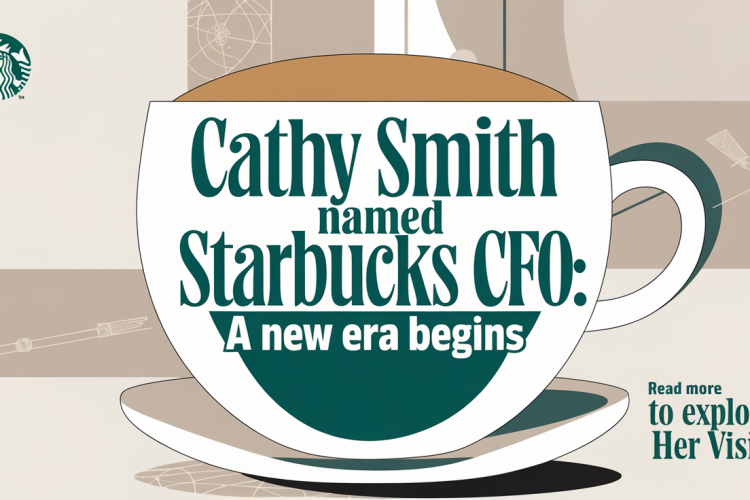Starbucks has heralded a significant shift in its executive team with the appointment of Cathy Smith as its new Chief Financial Officer, effective April 2025. The seasoned finance executive brings an impressive background from her current role at Nordstrom and previous positions at retail giants including Target, Express Scripts, and Walmart International. Starbucks CEO Brian Niccol announced the leadership change on March 4, 2025, expressing confidence in Smith’s ability to contribute to the company’s transformation strategy. This strategic hire comes as part of Starbucks’ broader “Back to Starbucks” initiative aimed at revitalizing the brand through operational efficiency and enhanced customer experience.
A Finance Powerhouse Joins the Coffee Giant
Cathy Smith’s arrival at Starbucks represents a strategic addition to the company’s executive team at a pivotal moment. With her extensive retail finance experience, Smith is positioned to help steer the coffee chain through its current transformation phase. Her predecessor, Rachel Ruggeri, will assist in the transition period, ensuring continuity in financial leadership during this critical time.
Smith’s career trajectory showcases her versatility and proven ability to manage finances for major consumer brands. Before joining Starbucks, she demonstrated financial leadership at Nordstrom as CFO since 2023. Her resume also boasts impressive executive positions at Target, Express Scripts, Walmart International, and GameStop.
CEO Brian Niccol highlighted Smith’s qualifications in his announcement, noting, “Cathy brings incredible knowledge and extensive experience in retail, global operations, and turnaround success. I’m excited to partner with her as we continue our work on the Back to Starbucks plan.” This endorsement underscores the strategic importance of Smith’s appointment as the company pursues its revitalization efforts.
The retail sector has historically influenced coffee culture, much like the evolution of dessert traditions has shaped cafe offerings worldwide. Smith’s cross-industry experience provides valuable perspective on consumer behavior and retail operations that could benefit Starbucks’ future direction.

Track Record of Financial Leadership
Smith’s credentials as a financial executive are substantial and diverse. Her career reflects a pattern of successfully managing finances for major retail and consumer-facing businesses. This extensive background has prepared her to address the unique financial challenges facing Starbucks in today’s competitive market.
During her tenure at Nordstrom, Smith earned a total compensation package of $8.5 million in 2023. This included a base salary of $605,769 and approximately $6.5 million in stock awards, reflecting the high value placed on her financial leadership abilities in the retail sector.
Her previous CFO role at Target provided her with experience managing finances for a major retailer with diverse product offerings and complex supply chains. At Express Scripts, Smith gained valuable insights into managing financial operations for a service-oriented company with recurring revenue streams, a model that shares similarities with Starbucks’ business approach.
Smith’s international experience from her time at Walmart International could prove particularly valuable as Starbucks continues to expand its global footprint. Her understanding of international financial markets and cross-cultural consumer preferences may help inform Starbucks’ global strategy, similar to how global food trends cross borders and adapt to local markets.
Premium Compensation Package Details
To secure Smith’s talents, Starbucks has assembled an attractive compensation package that recognizes her market value and compensates for what she leaves behind at Nordstrom. The comprehensive financial arrangement includes a base salary of $925,000 annually, representing a significant increase from her previous position.
Beyond the base salary, Smith will be eligible for an annual bonus of 125% of her base salary, providing substantial performance-based incentive. The package also includes a $5 million signing bonus and equity awards totaling $10.9 million, demonstrating Starbucks’ commitment to this key hire.
The $5 million signing bonus serves a specific purpose – compensating Smith for the approximately $15 million in cash incentives and equity awards she forfeits by departing Nordstrom before fully vesting. This bonus will be distributed in two separate installments, contingent upon her continued employment with Starbucks.
Such competitive compensation structures are common when attracting top executive talent, particularly for companies implementing transformation strategies. The investment signals to shareholders Starbucks’ determination to bring in proven financial leadership capable of guiding the company through its current challenges, much like how traditional culinary staples evolve while maintaining their core appeal.
Part of a Broader Leadership Transformation
Smith’s appointment isn’t occurring in isolation but rather as one element of a more comprehensive leadership overhaul at Starbucks. Under CEO Brian Niccol’s direction, the company is implementing strategic leadership changes designed to reinvigorate the brand and improve performance.
Another significant leadership development is the appointment of Hisae Morii, who will make history as the first woman to lead Starbucks Japan’s licensed business starting April 1, 2025. This move reflects Starbucks’ commitment to diversity in leadership while strengthening its position in the important Japanese market.
These executive changes are paired with broader organizational restructuring. Starbucks has announced plans to lay off approximately 1,100 corporate employees as part of its efficiency improvement initiative. This difficult decision reflects the company’s determination to streamline operations and reduce overhead costs.
The combination of new leadership and organizational restructuring demonstrates a comprehensive approach to Starbucks’ transformation strategy. Similar to how cultural food traditions adapt while maintaining their significance, Starbucks aims to preserve its core identity while evolving its operational approach.
Implementing the “Back to Starbucks” Vision
Smith will play a crucial role in executing CEO Brian Niccol’s “Back to Starbucks” plan, which focuses on returning to the company’s core strengths while improving operational efficiency. This strategy addresses declining sales trends by refocusing on what made Starbucks successful initially – quality products and exceptional customer experience.
One key component of this strategy involves simplifying the Starbucks menu by eliminating overly complex and underperforming drinks. This menu rationalization aims to improve service speed, reduce waste, and focus on beverages that resonate most strongly with customers.
The company is also working to streamline operations throughout its supply chain and store-level processes. These operational improvements should reduce costs while enabling store employees to focus more attention on customer service rather than complicated preparation procedures.
Smith’s financial expertise will be essential in balancing the short-term costs of this transformation against the expected long-term benefits. Her experience in managing finances during periods of strategic change will help ensure that Starbucks maintains financial stability while implementing these necessary adjustments to secure future growth and profitability, similar to how certain food traditions offer benefits beyond their immediate appeal.

Financial Challenges and Opportunities Ahead
As Smith steps into her new role, she faces both significant challenges and promising opportunities. Starbucks has experienced uneven financial performance in recent quarters, with particular weakness in the critical Chinese market and growing competition in the U.S.
Smith will need to help the company navigate the substantial costs associated with its transformation strategy while maintaining investor confidence. This includes managing the financial implications of workforce reductions, menu simplification, and potential store closures or relocations.
Despite these challenges, Starbucks maintains numerous financial strengths, including its powerful global brand, loyal customer base, and substantial cash flow. Smith’s expertise in financial optimization could help the company leverage these assets more effectively while addressing areas of underperformance.
With her demonstrated ability to manage finances during periods of significant organizational change, Smith appears well-positioned to help Starbucks navigate this critical transition period. Her leadership will be crucial in ensuring that the company’s financial strategy aligns with and supports its broader operational and marketing initiatives as it works to recapture its distinctive position in the competitive coffee market.



